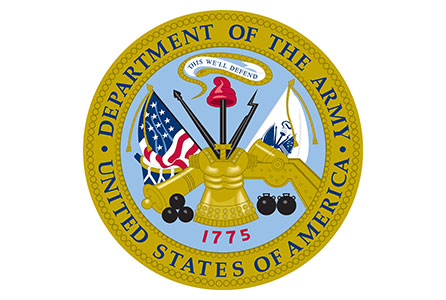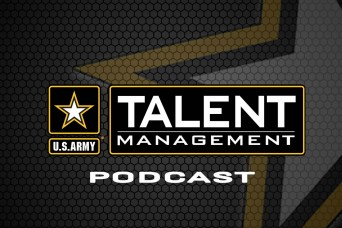 Brig. Gen. Funck Assumes Leadership of Army Talent Management Task Force
June 18, 2021
Brig. Gen. Funck Assumes Leadership of Army Talent Management Task Force
June 18, 2021
 Outreach Program Promotes Diversity in Combat Arms
May 24, 2021
Outreach Program Promotes Diversity in Combat Arms
May 24, 2021
 Army Talent Management Task Force releases podcast channel
April 22, 2021
Army Talent Management Task Force releases podcast channel
April 22, 2021
 New Pilot Program Helps Army Select Best Fit for First Sergeants
April 19, 2021
New Pilot Program Helps Army Select Best Fit for First Sergeants
April 19, 2021
 Annual talent management conference underscores future of work
March 20, 2021
Annual talent management conference underscores future of work
March 20, 2021
 "The 'So What' Behind KSBs - Part 2"
March 10, 2021
"The 'So What' Behind KSBs - Part 2"
March 10, 2021
 New report highlights talent management milestones
March 8, 2021
New report highlights talent management milestones
March 8, 2021
 Army moves forward with enlisted talent programs
February 26, 2021
Army moves forward with enlisted talent programs
February 26, 2021
 Army Talent Management welcomes new director
February 1, 2021
Army Talent Management welcomes new director
February 1, 2021
 Army releases names of officers selected for battalion command
February 1, 2021
Army releases names of officers selected for battalion command
February 1, 2021
 The "So What" Behind KSBs
December 8, 2020
The "So What" Behind KSBs
December 8, 2020
 Prototype Sergeants Major Assessment Program at Fort Knox on the right path
November 23, 2020
Prototype Sergeants Major Assessment Program at Fort Knox on the right path
November 23, 2020
 New retirement extensions allow the Army to retain critical talent
December 20, 2020
New retirement extensions allow the Army to retain critical talent
December 20, 2020
 Army releases names of officers selected for colonel-level command
December 15, 2020
Army releases names of officers selected for colonel-level command
December 15, 2020
 3ID Officer selected for Brevet Promotion
October 26, 2020
3ID Officer selected for Brevet Promotion
October 26, 2020
 Chat with talent management experts at virtual booth
October 12, 2020
Chat with talent management experts at virtual booth
October 12, 2020
 SMA shares perspective on new talent management program
January 21, 2020
SMA shares perspective on new talent management program
January 21, 2020
 Army releases new Talent Alignment Process video
September 4, 2019
Army releases new Talent Alignment Process video
September 4, 2019
 Army talent management featured at annual women's symposium
September 12, 2019
Army talent management featured at annual women's symposium
September 12, 2019
 Army captains to take GRE to assess talent
October 8, 2019
Army captains to take GRE to assess talent
October 8, 2019
 Army Talent Management at AUSA 2019
October 10, 2019
Army Talent Management at AUSA 2019
October 10, 2019
 Army looking at new talent management initiatives for warrant officers
October 23, 2019
Army looking at new talent management initiatives for warrant officers
October 23, 2019
 Five things Army officers and units should know about the Assignment Interactive Module
May 14, 2019
Five things Army officers and units should know about the Assignment Interactive Module
May 14, 2019
 Army Talent Management Task Force conducts LPD with HQDA Staff Officers
October 24, 2019
Army Talent Management Task Force conducts LPD with HQDA Staff Officers
October 24, 2019
 One officer's experience with the Army Talent Alignment Process
November 12, 2019
One officer's experience with the Army Talent Alignment Process
November 12, 2019
 How a brigade in Korea built its team using the Army Talent Alignment Process
December 12, 2019
How a brigade in Korea built its team using the Army Talent Alignment Process
December 12, 2019
 Army expands command assessment program to senior enlisted leaders
October 28, 2020
Army expands command assessment program to senior enlisted leaders
October 28, 2020
 Officers vie for battalion command positions under new assessment process
January 27, 2020
Officers vie for battalion command positions under new assessment process
January 27, 2020
 Army announces new battalion commander selection program
November 6, 2019
Army announces new battalion commander selection program
November 6, 2019
 Talent management front and center at annual conference
October 5, 2020
Talent management front and center at annual conference
October 5, 2020
 Army releases documentary about new leader assessments
September 14, 2020
Army releases documentary about new leader assessments
September 14, 2020
 New tool gathers subordinate input to help inform commander selection
August 28, 2020
New tool gathers subordinate input to help inform commander selection
August 28, 2020
 Army vice chief walks through brigade command program to witness Army’s newest assessment tool
August 13, 2020
Army vice chief walks through brigade command program to witness Army’s newest assessment tool
August 13, 2020
 Talent management making strides in ‘people first’ Army
August 14, 2020
Talent management making strides in ‘people first’ Army
August 14, 2020
 Army to hold selection assessment program for colonels
July 15, 2020
Army to hold selection assessment program for colonels
July 15, 2020
 Soldiers sound off to Army leadership in new survey
May 7, 2020
Soldiers sound off to Army leadership in new survey
May 7, 2020
 Changes to the Army Talent Alignment Process 21-01 Winter Move Cycle
May 8, 2020
Changes to the Army Talent Alignment Process 21-01 Winter Move Cycle
May 8, 2020
 Services talk talent management at quarterly meeting
March 24, 2020
Services talk talent management at quarterly meeting
March 24, 2020
 Army leaders expand 'war for talent' initiatives
February 28, 2020
Army leaders expand 'war for talent' initiatives
February 28, 2020
 Changes to promotion process provide officers more career flexibility
February 20, 2020
Changes to promotion process provide officers more career flexibility
February 20, 2020
 DA G-1 Sergeant Major and HRC Command Sergeant Major discuss enlisted talent management
December 17, 2019
DA G-1 Sergeant Major and HRC Command Sergeant Major discuss enlisted talent management
December 17, 2019
 Army Talent Based Branching Video Goes Live
May 7, 2019
Army Talent Based Branching Video Goes Live
May 7, 2019
 KSB Training and Information for Unit S1's
May 7, 2019
KSB Training and Information for Unit S1's
May 7, 2019
 Talent Management Task Force visits Hood
May 7, 2019
Talent Management Task Force visits Hood
May 7, 2019
 Director, Army Talent Management Task Force
Brig. Gen. Brett Funck
Director, Army Talent Management Task Force
Brig. Gen. Brett Funck
| 1 | Army Talent Alignment Process |
| 2 | Officer management systems to a talent-based approach |
| 3 | Officer management systems to a talent-based approach (Short) |
| 4 | Army Talent Management Leader Professional Development Briefing |
| 5 | Institute of Land Warfare (ILW) Breakfast Series - Nov. 14, 2019 |
| 6 | Army Talent Alignment Process (ATAP) by the Numbers |
| 7 | Cultural Lines of Defense Against Change |
| 8 | Battalion Commander Assessment Program |
| 9 | Inaugural Battalion Commander Assessment Program Results |
| 10 | Special Forces Medic |
| 11 | Paving the Way: The BCAP Experience |
| 12 | Battalion Commander Assessment Program: Documentary |
| 13 | Why I Serve |
| 14 | Multiple Launch Rocket System |
| 15 | Could You be a Psychological Operations Specialist? |
| 16 | Why is Leader Development Important to the Army? |
| 17 | Horse Cavalry Detachment is Seeking Recruits! |
| 18 | First in Deed |
| 19 | Welcome to the Battalion Commander Assessment Program |